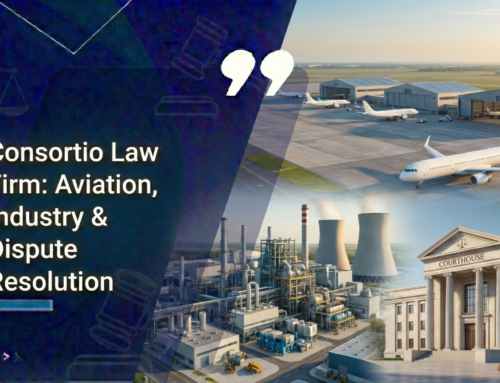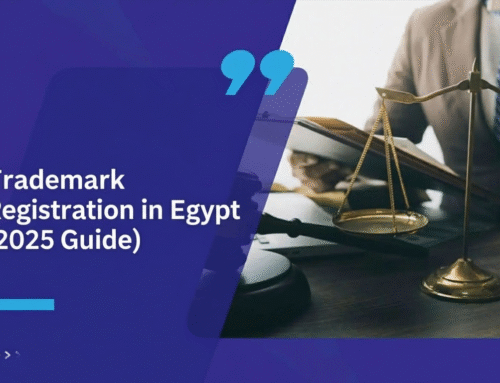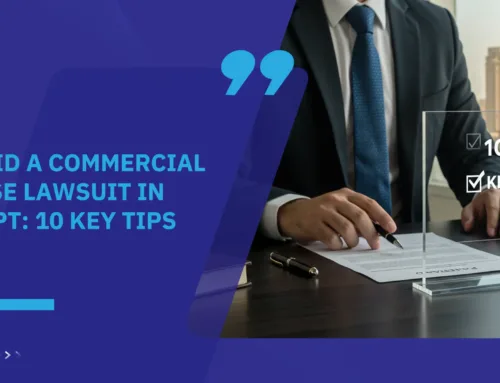In the vibrant and rapidly evolving market of Egypt, commercial real estate stands as a cornerstone of economic growth and investment opportunity. However, with great potential comes complex challenges, especially when disputes arise. Navigating the maze of Commercial Real Estate Disputes in Egypt requires not only legal expertise but also strategic insight and proactive solutions. Whether you’re an investor, developer or business owner, understanding the dynamics of these conflicts can turn potential setbacks into powerful opportunities for growth and success.
Legal Framework for Commercial Real Estate Disputes in Egypt
Commercial real estate disputes in Egypt are governed by a comprehensive legal framework combining civil, property, procedural and investment laws, including:
- Egyptian Civil Code (Law No. 131 of 1948): Governs contracts, leases, property rights.
- Real Estate Registration Law (Law No. 114 of 1946 and Law No. 9 of 2022, amended): Requires proper registration for legal ownership.
- Investment Law (Law No. 72 of 2017): Protects real estate investments especially for foreigners.
- Building Laws (No. 119 of 2008): Regulate zoning, construction and land use.
Additionally, laws regulating foreign ownership of property and building permits further shape dispute contexts.
Recent legal reforms aimed at digitizing land registration and promoting real estate investment reflect the evolving landscape, providing clearer frameworks and encouraging dispute resolution mechanisms to facilitate commercial activity and investment confidence in the sector.
Common Causes of Commercial Real Estate Disputes
Commercial real estate involves complex deals and multiple parties, making disputes common. These conflicts can arise from various reasons including:
- Breach of Contract: Disagreements arising when one party fails to fulfill the terms of a lease, purchase agreement or other contract.
- Boundary and Property Line Disputes: Conflicts over the exact location of property boundaries or encroachments.
- Title and Ownership Issues: Disputes related to unclear, defective or contested property titles or ownership claims.
- Lease Disputes: Conflicts between landlords and tenants regarding rent, lease duration, maintenance responsibilities or renewal options.
- Construction and Development Disputes: Issues concerning delays, defects, payments or quality of work in construction projects on commercial property.
- Zoning and Land Use Disputes: Disagreements over compliance with zoning laws, permitted land uses or changes in zoning classifications.
- Financing and Mortgage Disputes: Disagreements related to loan terms, foreclosures or lender-borrower conflicts.
- Property Management Conflicts: Disputes involving property managers and owners or tenants, including maintenance, repairs and operational issues.
- Joint Venture and Partnership Disputes: Conflicts between parties who co-own or co-develop commercial real estate regarding profits, management or decisions.
The Impact of Commercial Real Estate Disputes on Business Operations
Commercial real estate disputes can disrupt business activities in several important ways:
-
Delays and Operational Disruption
Disputes involving lease terms, construction delays, or zoning compliance can stop a business from opening new locations, expanding existing spaces or even continuing normal operations.
These interruptions can lead to lost customers, missed deadlines and reduced productivity.
-
Financial Consequences
Legal fees, settlement costs, penalties and lost revenue during prolonged disputes can place significant strain on a business’s finances.
Additionally, businesses may be forced to pay for temporary relocation, additional security or repairsو none of which are typically budgeted.
-
Planning and Growth Challenges
Ongoing uncertainty caused by a dispute can delay critical decisions about investment, hiring, marketing and expansion.
Businesses may have to pause or cancel future projects due to the risk of unresolved property issues.
-
Reputational Harm
Publicized disputes or lawsuits can damage a company’s brand and public image. Clients, investors and business partners may lose trust in a company that appears to be involved in frequent or high-profile conflicts.
-
Strained Business Relationships
Disputes can break down relationships with landlords, tenants, contractors or joint venture partners. Once trust is lost, future cooperation becomes difficult, potentially limiting future business opportunities or access to desirable locations.
-
Distraction from Core Business Goals
Leadership and staff often get pulled into managing the dispute, taking time and energy away from running the core business. This can lead to inefficiencies, low morale and a loss of focus on customer satisfaction or innovation.
Dispute Resolution Methods in Commercial Real Estate in Egypt
In Egypt, there are several dispute resolution methods available for commercial real estate disputes each with its own benefits and drawbacks depending on the nature of the conflict.
These common methods include:
-
Negotiation
Negotiation is typically the first and most straightforward method used to resolve commercial real estate disputes in Egypt.
- It involves direct discussions between the parties without third-party involvement.
- Often used for minor issues such as rent adjustments, maintenance concerns or payment delays.
- It is informal, cost-effective and helps preserve business relationships.
- Success depends on the willingness of both sides to compromise and reach a solution.
-
Mediation
Mediation is a voluntary process where a neutral third party facilitates discussion to help parties reach a mutually acceptable agreement.
- It provides a structured yet flexible setting for resolving disputes.
- Commonly used in landlord-tenant issues, partnership disagreements or lease disputes.
- The mediator does not impose a decision but guides parties toward their own resolution.
- It is private, confidential and generally faster and cheaper than Litigation.
-
Arbitration
Arbitration offers a private and binding dispute resolution process, often preferred in commercial real estate contracts.
- A neutral arbitrator (or panel) hears evidence and issues a final, enforceable decision.
- Frequently used in contracts involving developers, investors and foreign entities.
- Arbitration clauses are often included in commercial lease or sale agreements.
- Proceedings are confidential and usually faster than court Litigation.
- Appeals are limited and the arbitrator’s decision is generally final.
In case of escalating conflicts, businesses can rely on our Arbitration services as an effective alternative dispute resolution method.
-
Litigation
Litigation is the formal legal process of resolving disputes through the Egyptian court system when other methods fail.
- It is used for complex or high-stakes disputes such as ownership claims, contract breaches or regulatory violations.
- Court decisions are legally binding and enforceable under Egyptian law.
- The process involves formal procedures, legal representation and often lengthy timelines.
- It can be expensive and public, but it ensures access to legal remedies and enforcement powers.
- In some cases, administrative authorities or specialized Economic Court s may be involved depending on the dispute type.
For more complex legal disputes, our Litigation services provide strong representation through the Egyptian court system.
How “Consortio Law Firm” Help to Protect Your Interests?
Commercial real estate disputes in Egypt can threaten your investments, disrupt operations and drain resources. Thus, having a trusted legal partner by your side ensures you have the expertise and support needed to protect your rights, resolve conflicts efficiently and safeguard your business interests throughout the dispute process.
“Consortio Law Firm” actively protects your business interests by providing comprehensive legal support to safeguard your business interests during commercial real estate disputes in Egypt.
Our services are tailored to the complexities of the local market and designed to minimize risk, financial loss and operational disruption.
These services including:
- We assess your case thoroughly to identify legal risks and the best path forward, helping you avoid unnecessary escalation.
- We draft and review contracts to ensure your rights are protected and to reduce the chances of future disputes.
- We represent you in negotiations and mediation to resolve conflicts efficiently and preserve valuable business relationships.
- We handle arbitration and Litigation on your behalf, ensuring strong advocacy whether before CRCICA or Egyptian courts.
- We navigate regulatory issues by engaging with government bodies like NUCA to resolve land use, zoning and permit conflicts.
- We focus on minimizing your losses, financial, operational and reputational, so your business can stay on track.
Whether representing landlords, tenants, investors, or developers, “Consortio Law Firm” is here working to achieve favorable outcomes by combining deep legal knowledge with a practical understanding of the Egyptian real estate market.
Don’t wait and secure your business future now.
Contact us Today for a consultation via:
Phone number: 002-01028806061.
Via: WhatsApp.
Email: Info@consortiolawfirm.com.
FAQ’s
-
What is a commercial real estate dispute?
A commercial real estate dispute involves disagreements related to property ownership, leasing or transactions between parties such as landlords, tenants, buyers, sellers or contractors.
-
Can a commercial lease dispute be resolved without going to court?
Yes, many lease disputes can be resolved through negotiation, mediation or arbitration, avoiding the need for court intervention.
-
Should I hire a lawyer for a commercial real estate dispute in Egypt?
Yes, especially if the dispute is complex, involves large sums of money, or may require Litigation. A real estate lawyer such as “Consortio Law Firm” can guide you through legal processes and protect your interests.
-
Can a foreigner own commercial property in Egypt?
Yes, but with restrictions. Foreign ownership often requires approval and is subject to specific laws.
-
Can courts annul real estate contracts?
Yes, in cases of fraud, misrepresentation or violation of legal requirements.





